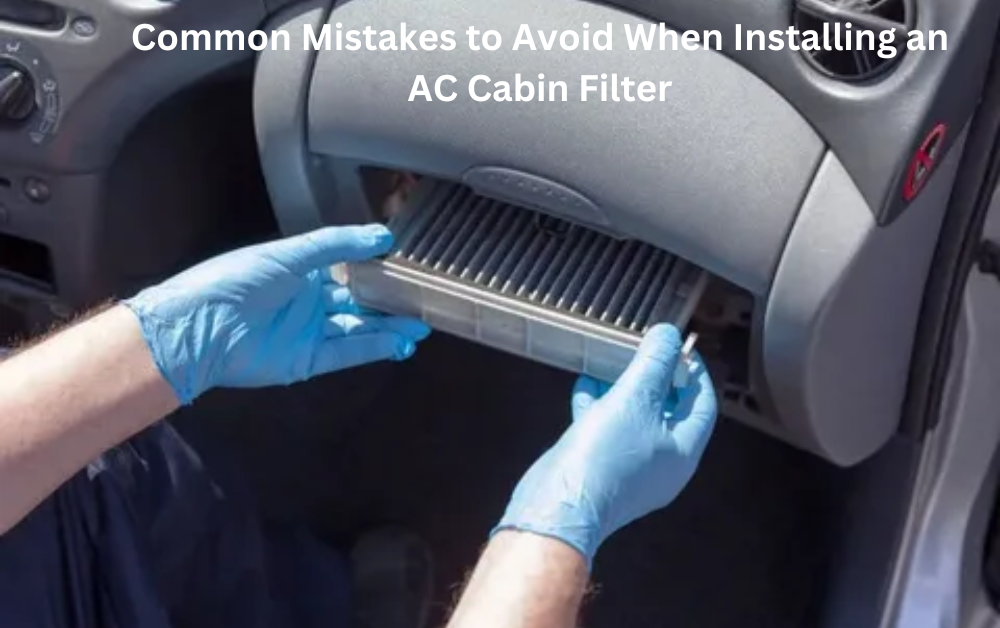Air conditioning in your car is a blessing, especially during hot summer days and chilly winter nights. However, to ensure that the air you breathe inside your vehicle is clean and healthy, it’s essential to have a properly functioning AC cabin filter. This unassuming component plays a significant role in improving the air quality within your car. But, there are common mistakes that many car owners make when installing or maintaining their AC cabin filters. In this guide, we’ll walk you through these mistakes and how to avoid them, so you can enjoy fresh and clean air every time you drive.
Neglecting Regular Replacement
Why Regular Replacement Matters
One of the most common mistakes car owners make is neglecting to replace their AC cabin filters regularly. These filters play a crucial role in trapping dust, pollen, allergens, and even harmful particles from entering your car’s cabin. Over time, they can get clogged and less effective, leading to poor air quality. Regular replacement is essential because:
Keeps the Air Fresh
Regularly replacing your car’s AC cabin filter is essential to maintain fresh and clean air inside the vehicle. The filter’s primary function is to trap dust, pollen, allergens, and pollutants, preventing them from entering the cabin. When the filter is clean and efficient, it effectively removes these contaminants, ensuring that the air remains fresh and free from unpleasant odors. Neglecting filter replacement can lead to reduced air quality and the infiltration of allergens, compromising your driving comfort. By adhering to recommended replacement intervals and keeping the filter in top condition, you can enjoy a refreshing and pleasant atmosphere during every ride.
Prevents Allergies
Maintains AC Efficiency
A clean filter ensures that your AC system operates efficiently, reducing strain on the system and potentially extending its lifespan.
How to Avoid This Mistake
To avoid this common mistake, it’s recommended to follow your car manufacturer’s guidelines on filter replacement. Typically, AC cabin filters should be replaced every 12,000 to 15,000 miles or at least once a year. Regularly check the filter’s condition and replace it if it appears dirty or clogged. It’s a simple and cost-effective maintenance task that can greatly impact your driving comfort and health.
Using Low-Quality Filters
The Importance of Quality Filters
Using high-quality AC cabin filters is essential as they efficiently trap airborne contaminants, ensuring clean and healthy air inside your car. Low-quality filters may compromise filtration, allowing pollutants to enter your vehicle’s cabin, potentially leading to allergies and health issues. Moreover, subpar filters tend to deteriorate quickly, resulting in frequent replacements and increased expenses over time. Additionally, they can impair your car’s AC performance by restricting airflow, causing the system to work harder and consume more fuel. Therefore, investing in quality filters recommended by your car’s manufacturer is a smart choice, ensuring optimal air quality, reduced maintenance costs, and improved AC efficiency. Using a subpar filter can lead to various issues:
Inefficient Filtration
Low-quality filters may not effectively trap pollutants, allowing them to enter your car’s cabin and compromise air quality.
Reduced Lifespan
Such filters may deteriorate quickly, leading to frequent replacements and added expenses.
Impaired AC Performance
Subpar filters can restrict airflow, making your AC system work harder and less efficiently.
How to Avoid This Mistake
To avoid this mistake, always opt for high-quality, branded AC cabin filters recommended by your car’s manufacturer. While they may cost slightly more, they offer superior filtration and longer lifespan, ultimately saving you money in the long run. Investing in a good filter ensures that you and your passengers breathe clean, healthy air.
Installing the Filter Incorrectly
The Consequences of Incorrect Installation
Installing an AC cabin filter incorrectly is a common mistake that can have adverse effects:
Airflow Restrictions
Incorrect installation can lead to reduced airflow, causing your AC system to work harder, consume more fuel, and potentially overheat.
Bypassing Filtration
A poorly installed filter may not seal properly, allowing unfiltered air to bypass the filter and enter the cabin.
Damage to Components
Mishandling during installation can damage sensitive AC components, resulting in costly repairs.
How to Avoid This Mistake
To avoid this mistake, carefully follow the installation instructions provided by your car’s manufacturer or the filter’s packaging. Ensure that the filter is properly seated and sealed to prevent any unfiltered air from entering the cabin. If you’re unsure about the installation, consider seeking professional assistance to ensure it’s done correctly.
Ignoring Unusual Odors or Reduced Airflow
The Significance of Unusual Odors
Ignoring unusual odors or reduced airflow from your car’s AC system is a mistake that can impact your comfort and health:
Mold and Bacteria Growth
Unusual odors may indicate the presence of mold or bacteria in the AC system, which can be harmful to breathe.
Reduced Cooling
Reduced airflow can lead to inadequate cooling during hot weather, making your car interior uncomfortable.
How to Avoid This Mistake
If you notice unusual odors or reduced airflow, don’t ignore them. These could be signs of a problem with your AC cabin filter or the AC system itself. Consider the following steps:
Inspection
Inspect your AC cabin filter for signs of mold, dirt, or damage. If you see any, it’s time for a replacement.
Professional Service
If the issue persists, consider seeking professional AC system inspection and maintenance.
Conclusion
Your car’s AC cabin filter is a small yet crucial component that significantly impacts the air quality and comfort inside your vehicle. By avoiding common mistakes such as neglecting regular replacement, using low-quality filters, installing the filter incorrectly, and ignoring unusual odors or reduced airflow, you can ensure that your AC system operates efficiently and provides you with clean and healthy air. Taking these simple steps will not only enhance your driving experience but also contribute to your overall health and well-being. So, keep these tips in mind and enjoy every drive in a car filled with fresh, clean air.



